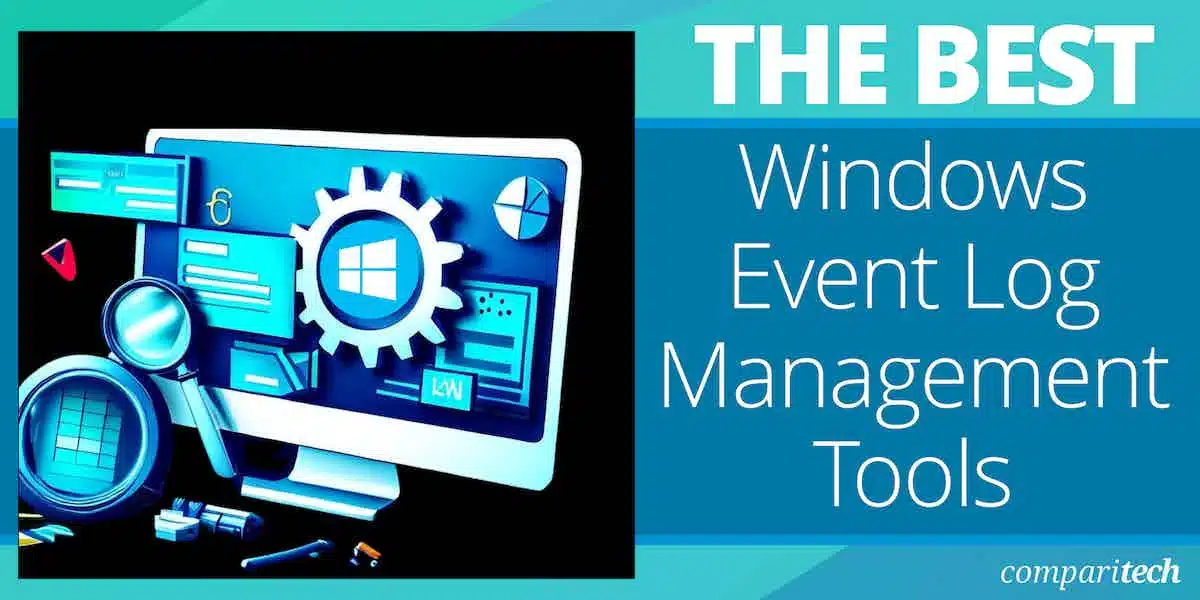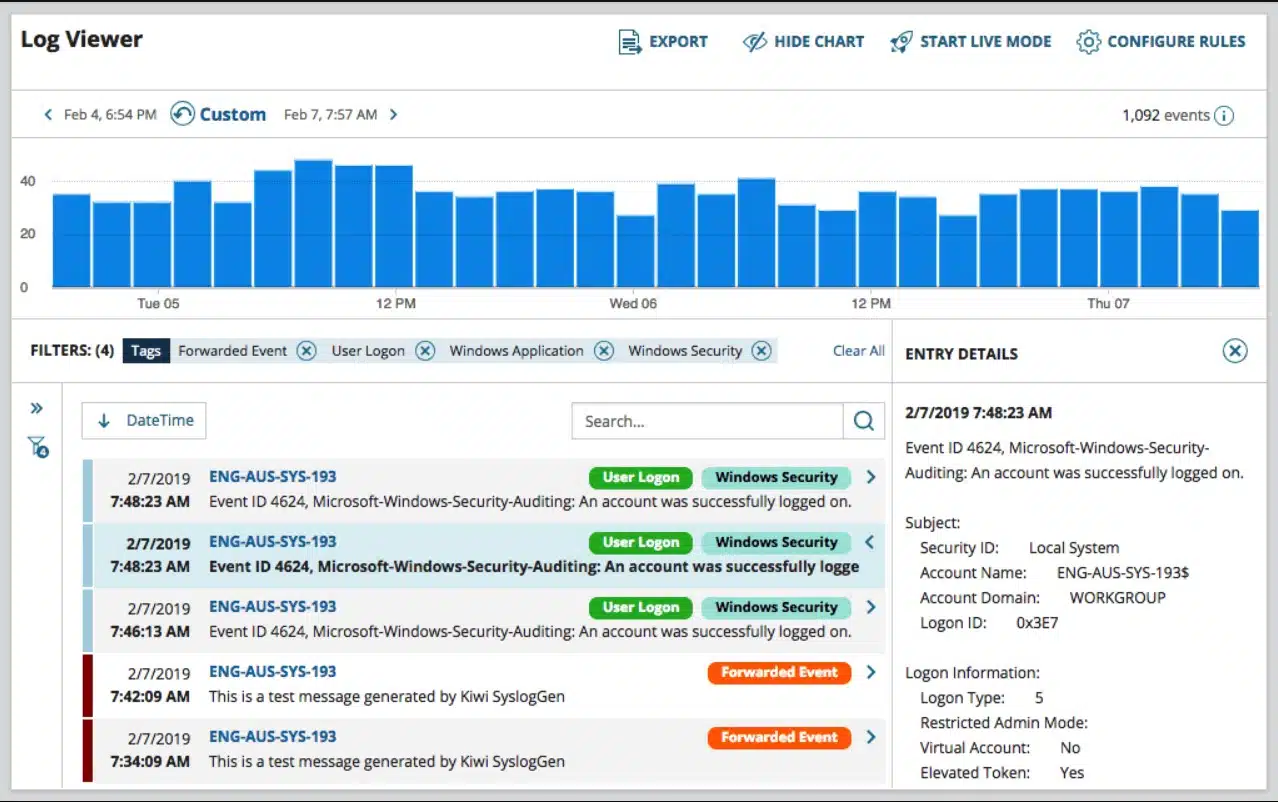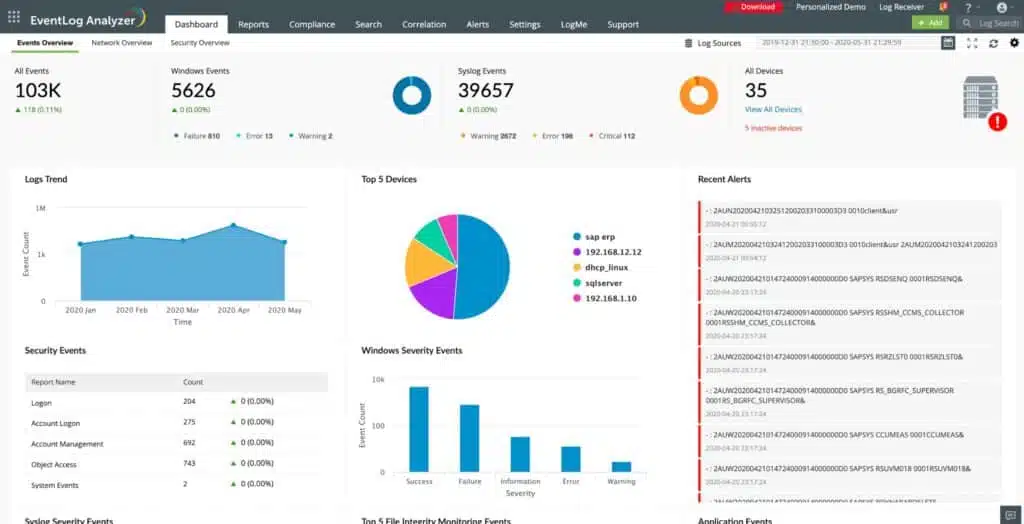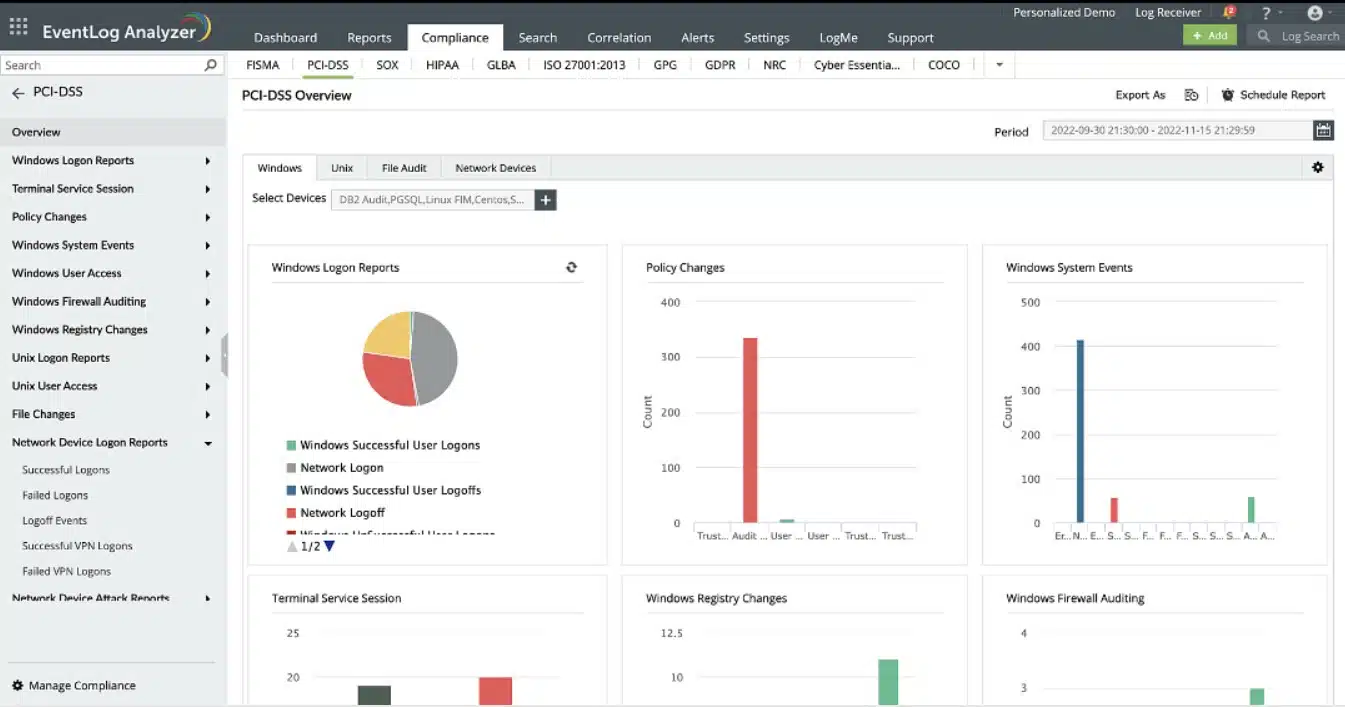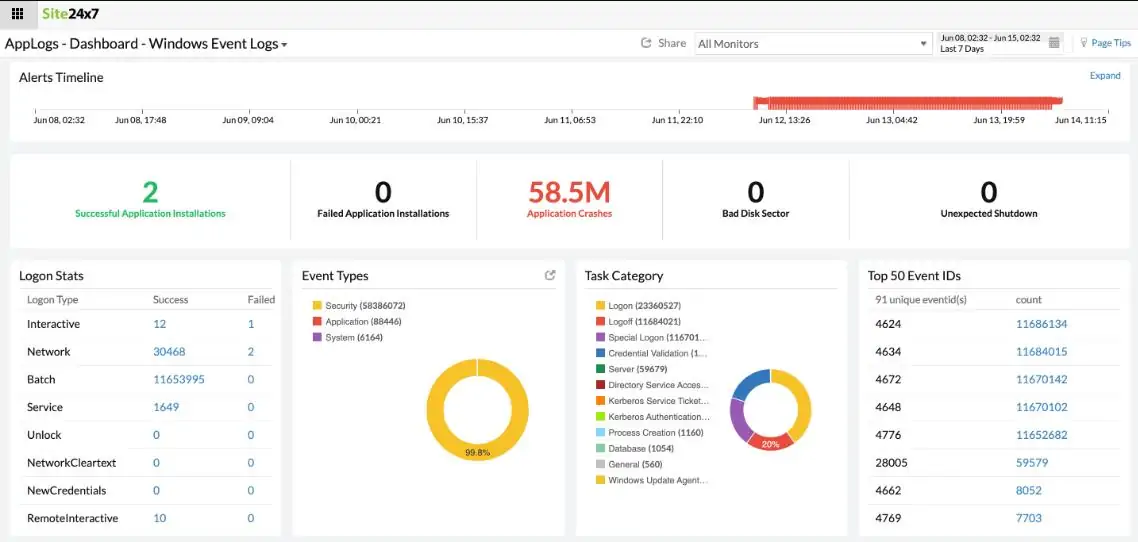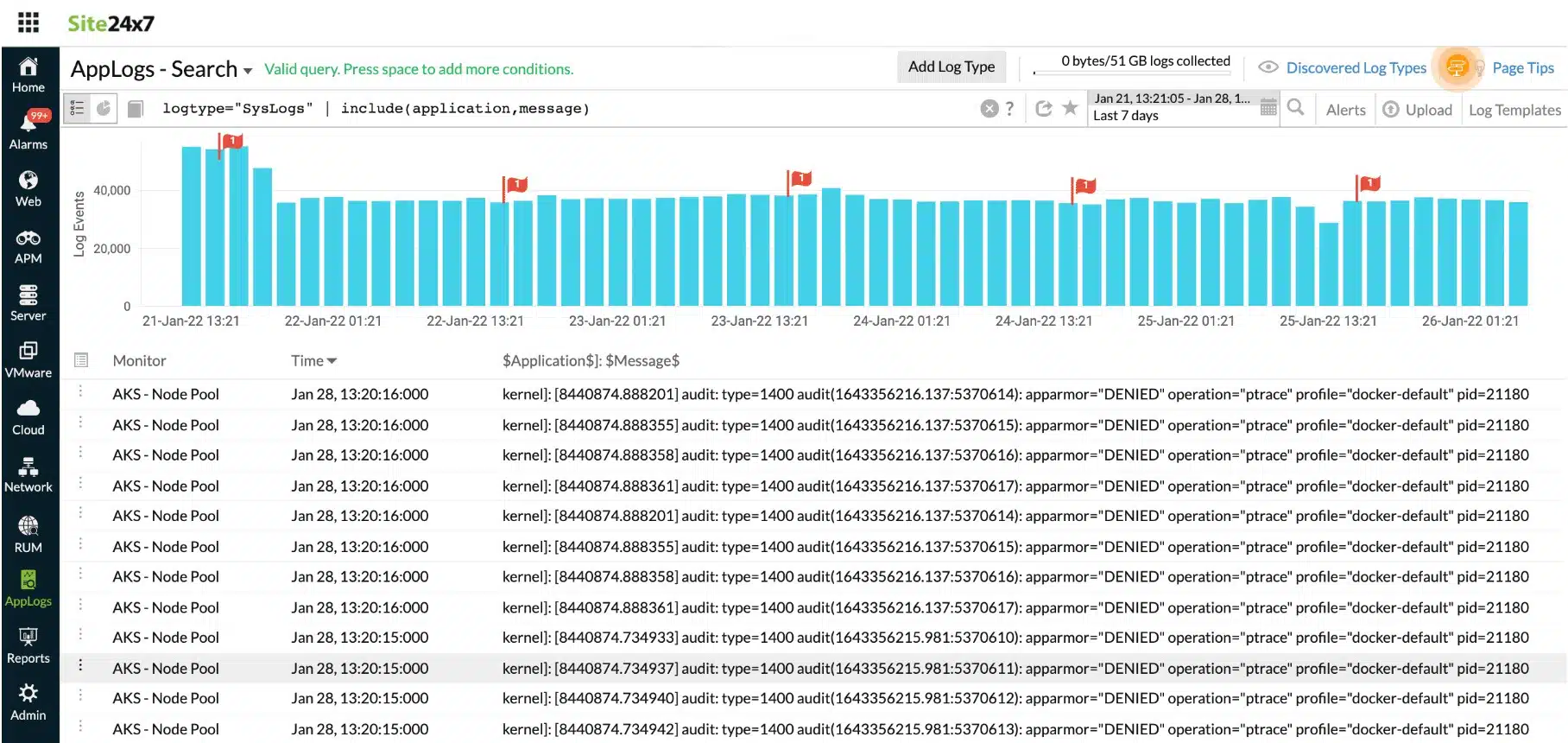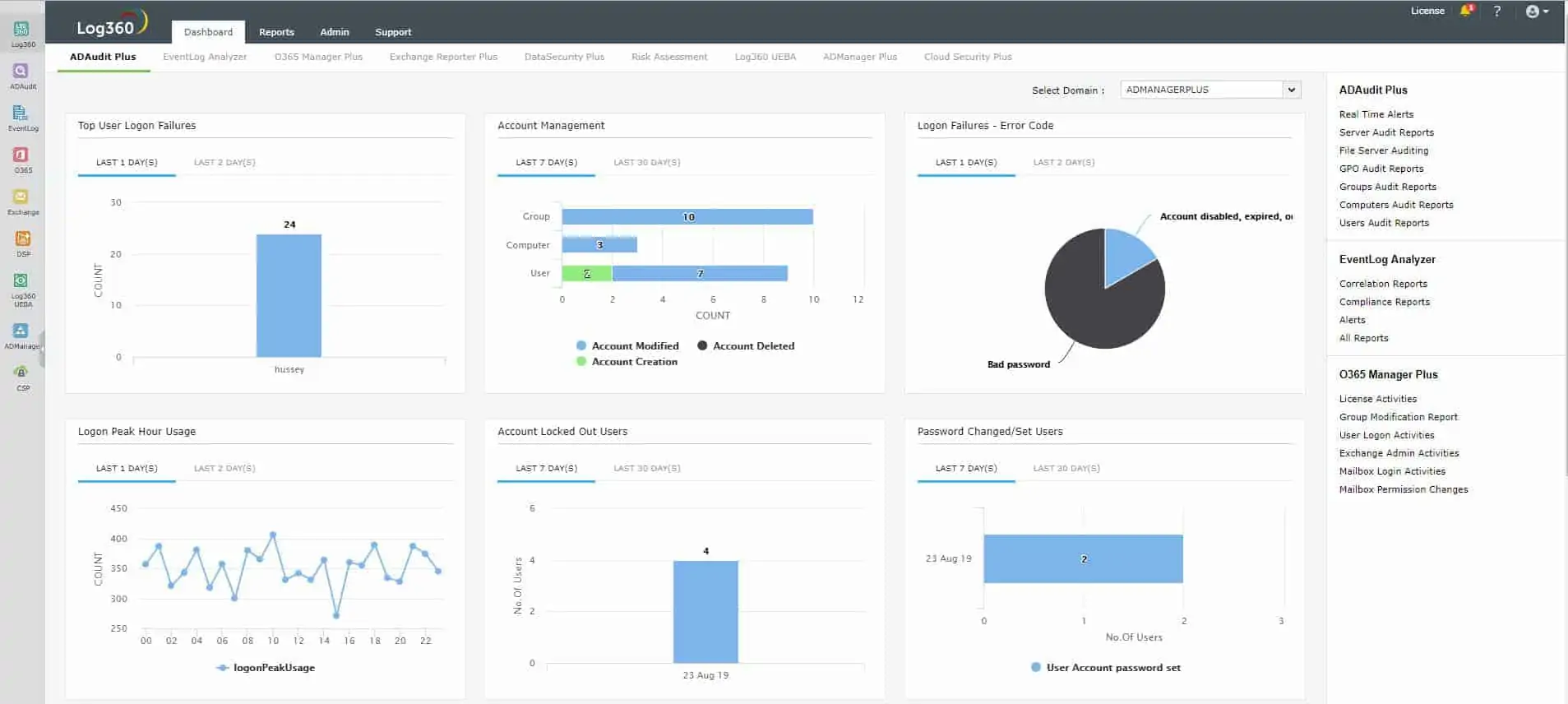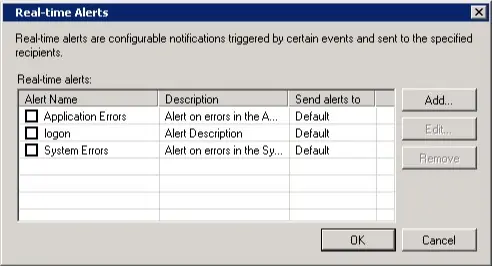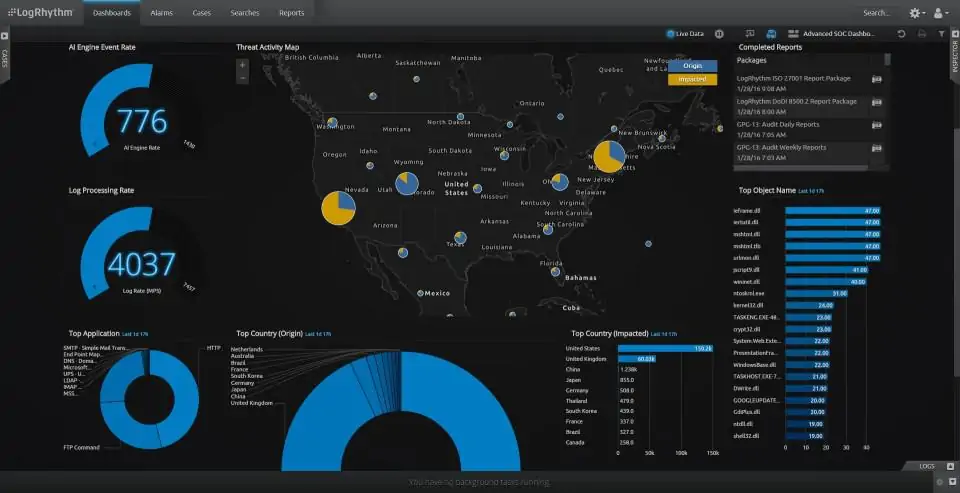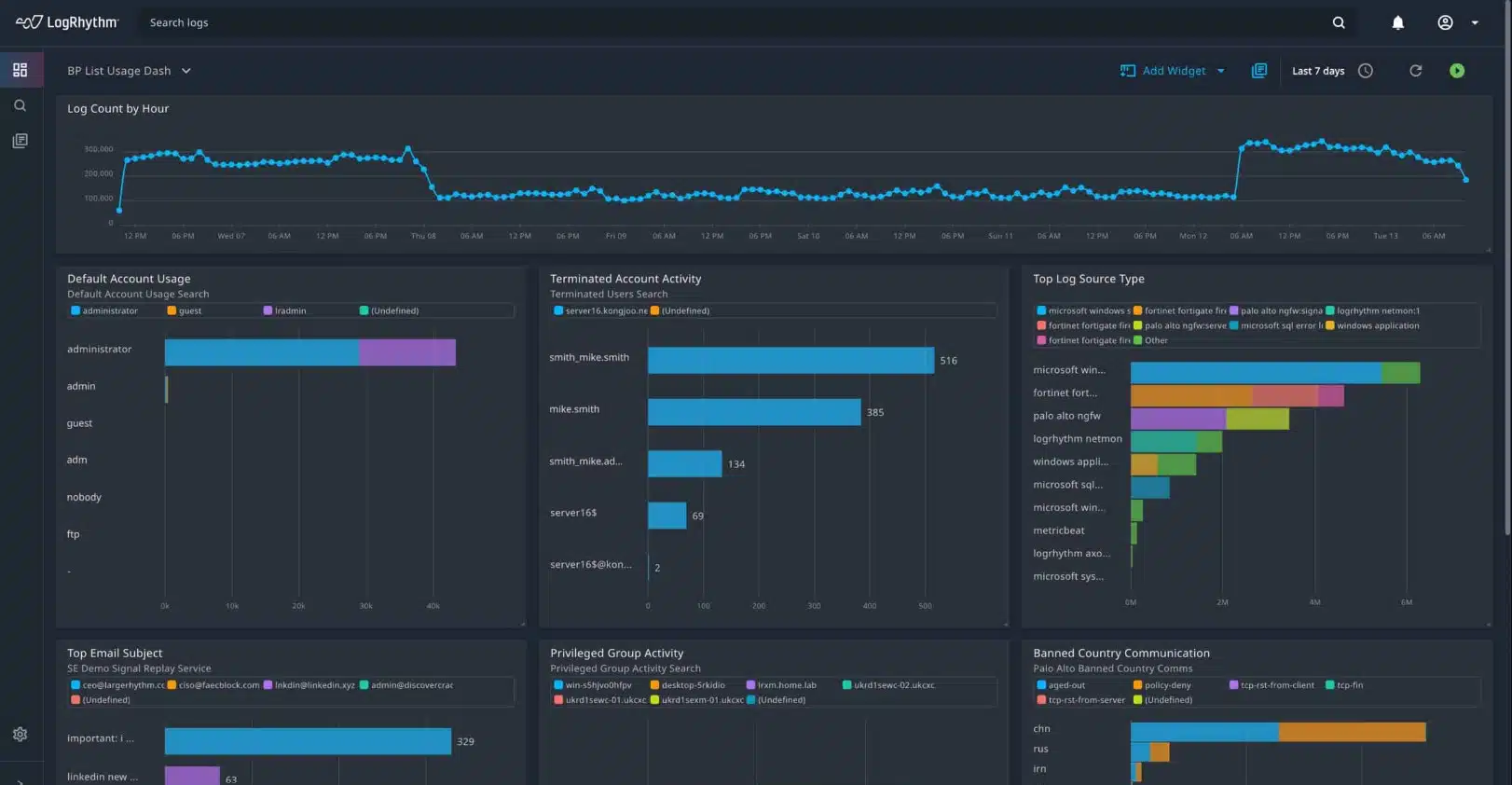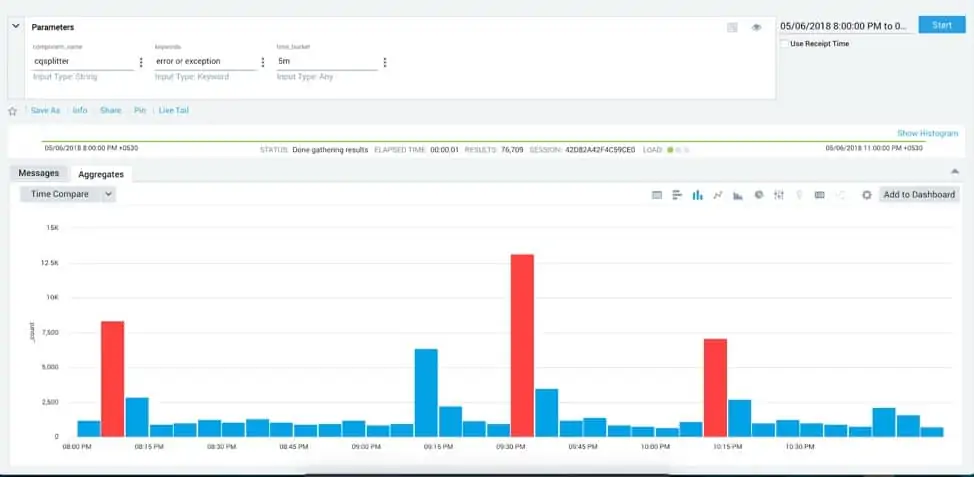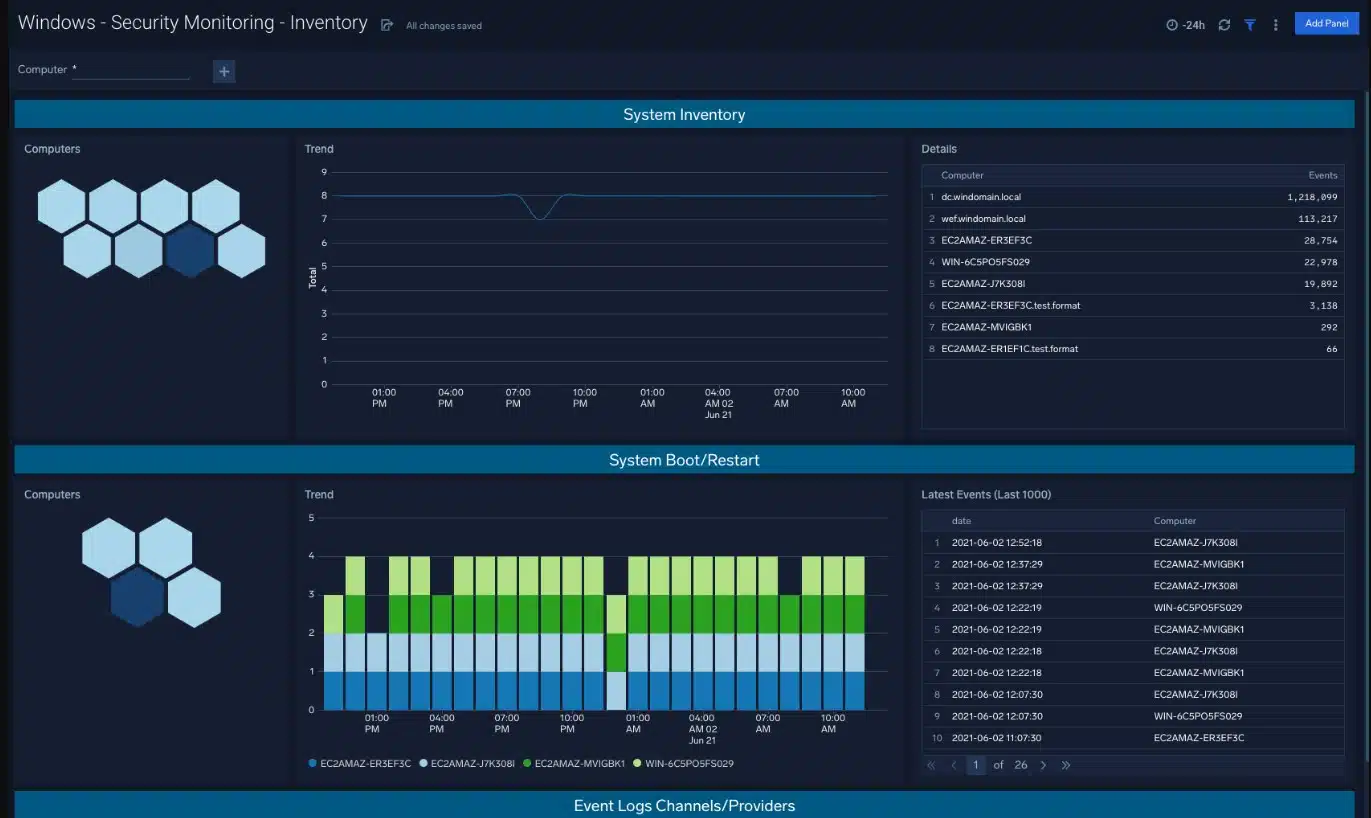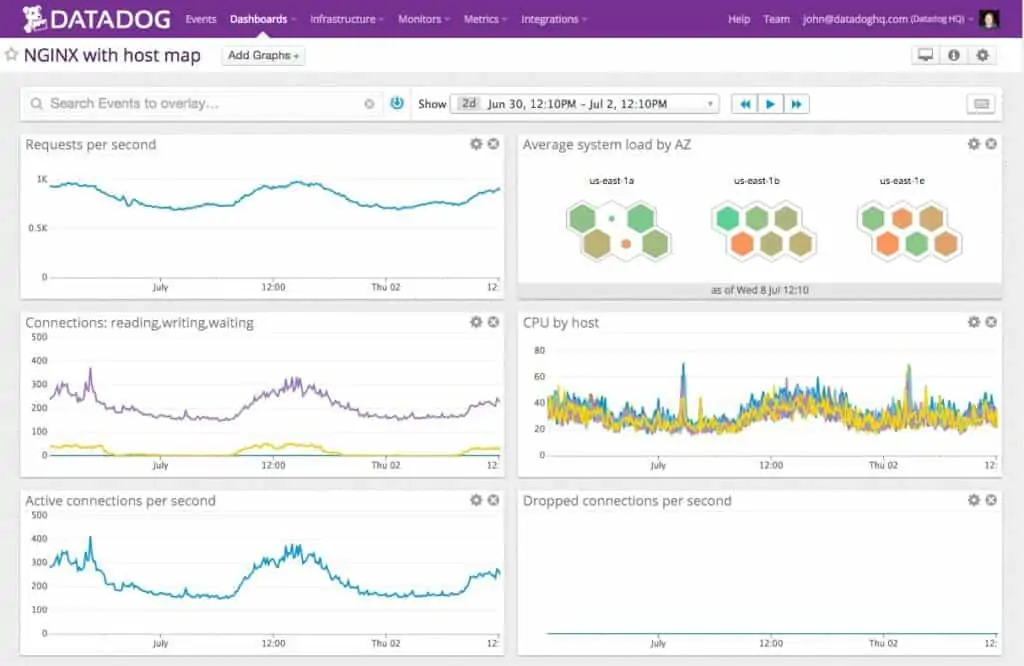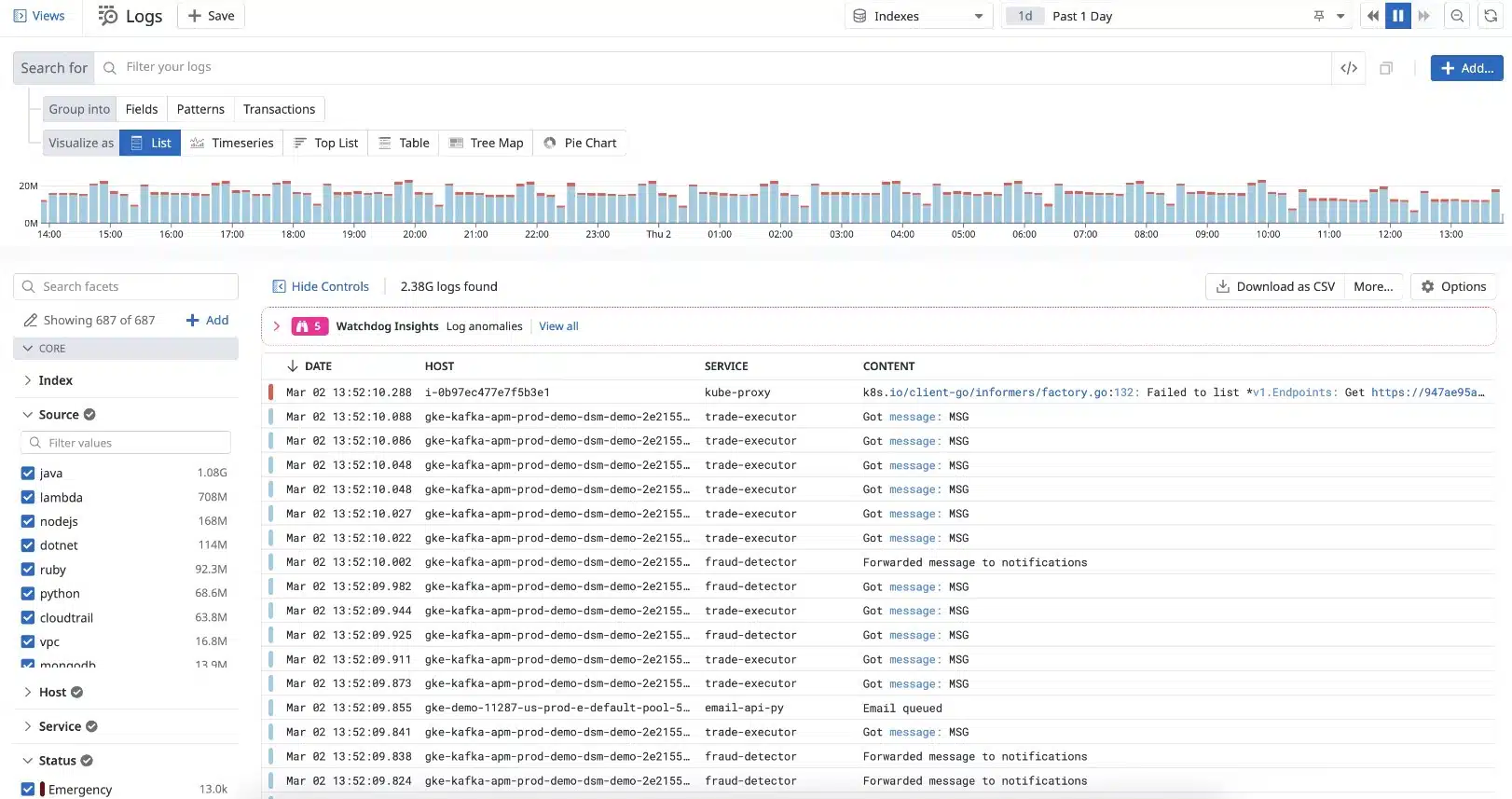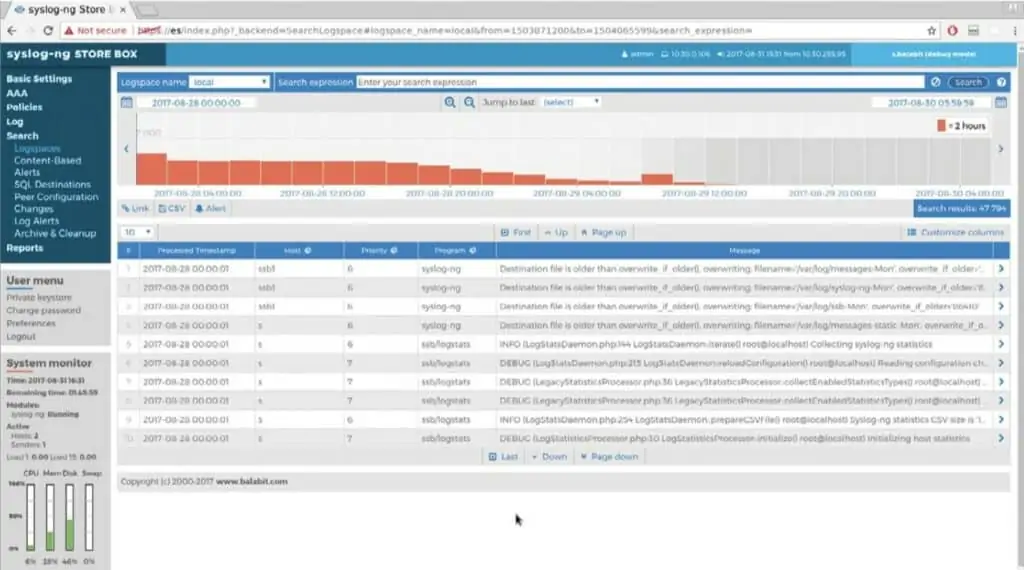Windows event log data is a goldmine of information that you can use to monitor network infrastructure and manage security events
While you can use Windows Event Viewer, log management tools are a superior alternative and enable you to manage Windows event log data with enhanced GUIs and visualizations.
Here is our list of the best tools to manage Windows Event Log / Event Viewer:
- SolarWinds Log Analyzer EDITOR’S CHOICE Our top pick for Windows event log management tool. Real-time event log monitoring tool for Windows with tagging, filtering, and customizable alerts. 30-day free trial available.
- ManageEngine EventLog Analyzer (FREE TRIAL) Log management software with custom reports, a correlation engine, and more. Download the 30-day free trial.
- Site24x7 Log Management (FREE TRIAL) A log server, consolidator, and processor that is available from several plans offered by a cloud-based system monitoring platform. 30-day free trial available.
- ManageEngine Log360 (FREE TRIAL) A SIEM that collects Windows Event logs plus Syslog messages and data from more than 700 applications. Runs on Windows Server. Start a 30-day free trial.
- Netwrix Event Log Manager Free event log management tool that centrally stores Windows event log data, and generates event alerts.
- LogRhythm SIEM platform with analytics, machine intelligence, workflow automation, alarms, and more.
- Sumo Logic Free log management software, available as a SaaS service with custom dashboards, real-time analytics, and machine learning.
- Datadog Cloud monitoring tool with log management capabilities, dashboards, alerts, search, filtering, and more.
- Syslog-NG Log management software with TLS encryption, log collection, storage, forwarding, and more.
The best tools to manage Windows Event Log / Event Viewer
The following reviews include some of the top log management tools, SIEM software, and other tools that provide network administrators with more visibility into logs.
Our methodology for selecting Windows Event log management tools
We reviewed the market for Windows Event log management software and assessed the options based on the following criteria:
- The ability to receive and file Windows Events messages
- A file management service that creates meaningful logfile names and a meaningfully named directory structure
- A logical logfile rotation strategy that prevents log files from becoming too large while maintaining a manageable file naming strategy
- Nice to have a log consolidator that can also receive Syslog messages and logs from applications
- A logfile metrics screen in the dashboard that shows the arrival rate of Windows Event messages and optionally displays those messages on the screen
- A free trial or a money-back guarantee that creates a no-risk assessment period
- A comprehensive tool that improves efficiency and is sold at a reasonable price
1. SolarWinds Log Analyzer (FREE TRIAL)
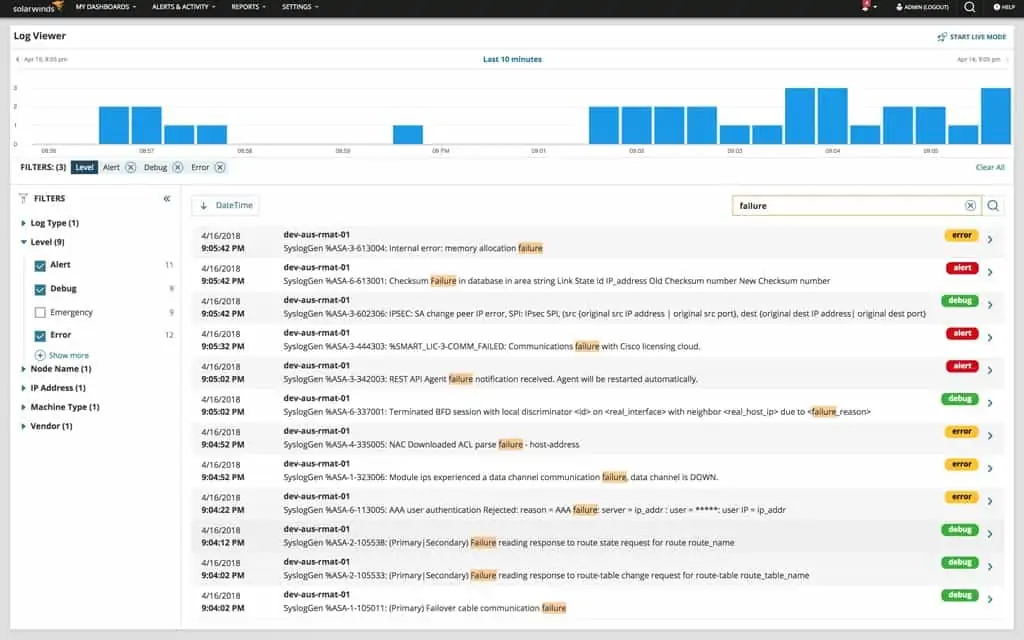
SolarWinds Log Analyzer is an event log monitoring tool for Windows that collects event log data. You can monitor event log data in real-time through syslog, SNMP traps, and system event logs. Data can be collected and monitored through one user interface.
Key Features:
- Real-Time Log Monitoring: Tracks log data as it occurs for immediate insights.
- Log Tagging and Filtering: Simplifies log navigation and categorization.
- Customizable Alerts: Sets alerts based on specific log criteria.
Why do we recommend it?
SolarWinds Log Analyzer runs on Windows Server and it will collect log messages from all around your network, covering all endpoints and the software that runs on them. The tool will collect Windows Events, Syslog messages, and logs from applications. The service can file or forward consolidated logs.
The software is very easy to use. Tagging and filtering enable the user to navigate through log data efficiently. There is also a search bar, and event logs are tagged with icons including warning, alert, error, emergency, and debug so that the user understands what’s happening more clearly.
A customizable alert system enables the user to set trigger conditions for alerts. Users can set alerts according to severity, and configure reset conditions to minimize false positives. Alerts can be sent from email and trigger external scripts to ensure you respond to performance events as they unfold.
Who is it recommended for?
This log analyzer shows log messages as they arrive, provides statistics on arrival rates by source, type, and severity, and it includes a data viewer for analysis. You can set up your own custom queries to perform on messages and link them through to custom alerts. However, this is not a full SIEM system.
Pros:
- Versatile Log Collection: Gathers logs from Syslog, SNMP traps, and system event logs.
- User-Friendly Interface: Makes log management accessible and efficient.
- Comprehensive Event Logs: Supports thorough analysis and troubleshooting.
Cons:
- Lacks SaaS Option: Only available as an on-premises solution.
- OS Compatibility: Requires Windows Server 2016 or 2019.
SolarWinds Log Analyzer is an excellent tool for managing Windows event log data through a single pane of glass. The platform provides extensive visibility through an intuitive platform that makes it easy to find the information you need to. Prices start at $1,495 (£1,210). You can download the 30-day free trial.
EDITOR'S CHOICE
SolarWinds Log Analyzer leads the pack with log management and analysis capabilities that are second to none. It provides real-time log collection, analysis and rich visuals.
We love the in-built search engine with filtering capabilities that help you search for log entries.
Download: Get 30-day FREE Trial
Official Site: https://www.solarwinds.com/log-analyzer
OS: Windows Server 2016 or 2019
Related post: Best Log Analysis Tools
2. ManageEngine EventLog Analyzer (FREE TRIAL)
ManageEngine EventLog Analyzer is a log management tool for Windows and Linux that can manage event logs and syslogs. You can process logs at 25,000 logs per second, which enables you to detect cyberattacks in real-time. The software can pull log data from services like WindowsServer, Linux, Oracle, Amazon Web Service, Apache, Cisco, HP, IIS, and more.
Key Features:
- High-Performance Log Processing: Handles up to 25,000 logs per second.
- Customizable Dashboard: Tailors log monitoring to specific needs.
- Compliance Reporting: Supports HIPAA, PCI DSS, ISO 27001, and more.
Why do we recommend it?
ManageEngine EventLog Analyzer is a compliance manager. It requires log messages for source data, so the package also includes a log collector and consolidator that can receive Windows Events, Syslog messages, and logs from applications – 750 sources in total. The tool provides a facility for manual analysis and also generates log message throughput statistics.
The correlation engine automatically processes event logs and compares them with other logs to detect the signs of a cyber attack. The automatic processing enables you to monitor log data more efficiently and stay on top of threats. However, you can use the search module to search manually as well.
Compliance reports enable you to create log reports and comply with a range of regulatory frameworks. The EventLog Analyzer creates reports that comply with PCI DSS, ISO 27001, GLBA, SOX, FISMA, and HIPAA regulations. Reports can also be customized and scheduled according to the preferences of the user.
Who is it recommended for?
ManageEngine provides a lot of deployment options for the EventLog Analyzer. It is available as a SaaS package and it can also be installed on Windows Server or Linux. The package provides log management and provides opportunities for manual analysis. It also implements security scanning. The Free edition would interest very small businesses.
Pros:
- Extensive Log Source Compatibility: Integrates with a variety of services and platforms.
- Efficient Cyber Attack Detection: Identifies security issues in real-time.
- Flexible Log Analysis: Manual and automatic log processing options.
Cons:
- Additional Cost for Multi-Site Monitoring: Can increase the total investment for larger networks.
ManageEngine EventLog Analyzer is one of the top free event log management tools. The free edition supports up to five log sources. Paid versions start at $595 (£481.78) with features like compliance reporting and log forensics. You can download the 30-day free trial.
3. Site24x7 Log Management (FREE TRIAL)
Site24x7 Log Management is a module in a suite of monitoring services delivered from the Cloud by Site24x7. This log management tool isn’t available as a standalone product. Instead, it is integrated into all of the packages that Site24x7 offers. These are:
- Website Monitoring
- Site24x7 Infrastructure
- Application Performance Monitor
- All-in-one
- MSP
The Site24x7 system is mainly resident in the Cloud but it does need a data collector to be installed on the monitored system. This agent is available for the Windows Server and Linux operating system and it can collect statistics over a network.
Key Features:
- Diverse Log Collection: Gathers Windows Events, Syslog, and application logs.
- Unified Log Format Consolidation: Streamlines log management across different sources.
- Comprehensive Data Analysis Tools: Enhances log data examination.
Why do we recommend it?
Site24x7 Log Management is a cloud-based log collector and consolidator. This system is able to gather log messages from multiple sites and file them. It also shows live messages as they arrive and can provide throughput statistics. The package can handle Windows Events and Syslog messages as well as application logs.
The data collector also catches log messages as they circulate around the server and network. It collects Windows Event messages and also Syslog and application log messages. These are sent to the Site24x7 server over a secure connection for processing. The server consolidates all of the log messages that it receives and converts them into a common format. This enables a unified treatment of log messages from all sources.
The Log Management system includes a data viewer, which can be accessed from the Site24x7 system dashboard. This includes data analysis features such as the ability to sort, filter, group, and summarize records.
Who is it recommended for?
The Site24x7 system is affordable for any size of enterprise. The service also provides a 30-day window for the storage of log files. You can set up the system to forward logs immediately to another system or accumulate them in files and move them to another storage location.
Pros:
- Cloud-Based Flexibility: Offers remote accessibility and management.
- Real-Time Log Viewing: Allows immediate log data analysis.
- Integrated with Site24x7 Services: Part of a comprehensive monitoring suite.
Cons:
- No Standalone Version: Must be used within the Site24x7 ecosystem.
All of the Site24x7 packages are subscription services and all are available on 30-day free trials. For example, you can get a free trial of the Site24x7 Infrastructure plan in order to try out the services’ Log Management tool.
4. ManageEngine Log360 (FREE TRIAL)
ManageEngine Log360 collects log messages and feeds them into a SIEM for threat detection. The collectors operating on Windows devices will pick up Windows Event logs and interact with software packages to extract operational data. The service can communicate with more than 700 applications. When operating on Linux, a Log360 agent will collect Syslog messages.
Key Features:
- Broad Application Integration: Works with over 700 applications for comprehensive coverage.
- Advanced Threat Intelligence Feed: Stays updated with current security threats.
- Regulatory Compliance Assistance: Meets HIPAA, PCI DSS, FISMA, SOX, GDPR, and GLBA standards.
Why do we recommend it?
ManageEngine Log360 is a megapack of log management and analysis systems and it provides a SIEM tool for security scanning. The EventLog Analyzer is included in the package along with five other log management tools for Windows Events, Syslog, application logs, and cloud platform reports. The system provides compliance reporting and data loss prevention.
The server component of Log360 installs on Windows Server but the collector system is available for a list of operating systems. The collectors send data to the log server, which converts their different formats into a common standard. The log server then files messages in a meaningful directory structure, rotating files daily or, for larger systems, more frequently. The log files need to be made available for investigation.
The dashboard for the system shows log throughput statistics and alerts. The console also includes a data viewer, which has manual analysis tools. Log messages are shown in the data viewer as they arrive and can also be loaded in from log files.
Who is it recommended for?
This is a very large package of system security tools and there is no Free edition, so it is unlikely to appeal to small businesses. As this tool is able to collect activity data from cloud platforms as well as on-premises assets, the system is ideal for use by businesses that operate a hybrid environment.
Pros:
- Extensive Log Management Tools: Offers a range of functionalities for different needs.
- Security-Oriented Features: Provides SIEM capabilities for enhanced protection.
Cons:
- Potentially Overwhelming Feature Set: Might be more than required for simple log management tasks.
The SIEM system has many features, which include a threat intelligence feed to speed up threat detection. The system produces alerts that can be channeled through service desk systems. You can assess ManageEngine Log360 with a 30-day free trial.
5. Netwrix Event Log Manager
Netwrix Event Log Manager is a free event log management software that can collect Windows event logs. It collects event logs and centrally stores them for the user to analyze. The tool allows you to monitor the event log data of multiple Windows devices from one centralized location.
Key Features:
- Centralized Event Log Storage: Aggregates logs for easier access and analysis.
- Real-Time Alerts: Notifies about important events as they occur.
- Event Summaries: Provides quick insights into log data trends.
Why do we recommend it?
Netwrix Event Log Manager is a free tool that collects Windows Events messages and provides a range of useful services, such as statistical analysis on message throughput and log forwarding or filing. Although this tool centralizes the collection of Windows Events, it doesn’t provide handling for Syslog messages.
Managing and configuring the Event Log Manager is simple for new users. The platform runs as a service so you don’t need to have it open at all times for monitoring. To configure the tool, all the user needs to do is add target computers to monitor the network and enter alert parameters to determine when notifications are generated.
The alerts system sends you email notifications whenever an important event happens to a connected device. You can control what alerts you’re notified about through a dialog box. For example, you can set the system to notify you about Application Errors and Systems Errors.
Who is it recommended for?
This is a nice free tool for viewing Windows Events and it also provides analysis features such as searching and sorting. You can also set up alerts that you can have sent to you by email. This offers an administrator with no budget a way to assemble a customized monitoring system.
Pros:
- Streamlined Windows Event Management: Specifically tailored for Windows environments.
- Free Tool: Accessible to businesses of any size without budget constraints.
Cons:
- Limited to Windows Event Logs: Does not handle other log types like Syslog.
Netwrix Event Log Manager is a reliable tool for enterprises looking to manage Windows Event Log and event viewer data for free. It’s available for Windows XP SP3 and above, Windows Server 2008, 2012, and 2016. You can download the software for free.
6. LogRhythm
LogRhythm is a SIEM platform that can be deployed on-premises or in the cloud with high-performance and speed. It uses ElasticSearch to maintain performance for users during indexing and searching. Log data captured by the program is searchable so that you can locate event log data fast and easily.
Key Features:
- Advanced SIEM Capabilities: Provides high-end security incident and event management.
- ElasticSearch Integration: Ensures performance during data indexing and searching.
- Machine Intelligence: Employs AI for more accurate threat detection.
Why do we recommend it?
LogRhythm is a top-of-the-line cloud-based SIEM system that has an option user behavior analytics module. This tool collects and consolidates log messages from many sources, which include Windows Events and Syslog messages. It also consolidates different log formats into a common layout and files them.
Through a web-based user interface, users can monitor security incidents throughout their entire network. Security analytics and visualizations provide you with an engaging presentation of log data. Log data is processed by Machine Data Intelligence to classify and structure log messages to produce over 800 different data sources.
When it comes time to respond to an issue, LogRhythm has an alarms system that notifies the users about security events. To lower the time to resolve the user can use SmartResponse to create automated response workflows. The SmartResponse feature allows you to automatically complete tasks such as running a vulnerability scan or disabling a user account.
Who is it recommended for?
There is a log manager at the heart of the LogRhythm system because logs are the source data for the SIEM, which is the key feature of the platform. However, if you are just looking for a log manager, this option is way more than you need.
Pros:
- Scalable Architecture: Adapts to various organizational sizes and complexities.
- Comprehensive Security Monitoring: Offers a full suite of security-focused features.
Cons:
- Complex for Simple Log Management Needs: May offer more functionality than required for basic log management.
It’s is an excellent log management solution for scalability. LogRhythm offers a flexible pricing model that supports up to an unlimited number of log sources and users. However, you need to request a quote from the company directly. You can watch the demo.
7. Sumo Logic
Sumo Logic is a free SaaS-based log management tool that collects and analyzes windows event logs. You can create custom dashboards and use real-time analytics to monitor security events throughout your network. The analytics system can identify performance anomalies by analyzing log patterns, which helps the user to make sense of log data.
Key Features:
- Custom Dashboards: Personalizes log data visualization.
- Real-Time Analytics: Delivers immediate insights into log patterns.
- Machine Learning-Driven Alerts: Provides intelligent notifications of anomalies.
Why do we recommend it?
Sumo Logic is a SaaS platform that provides system monitoring and log management. The Free edition provides the base plan for the system. If you are just looking for a log manager, this is as far as you need to go because the higher plans add on a SIEM and other security monitoring tools.
One of its advantages is the ability to share dashboards and reports with other users. Dashboards include a range of displays such as charts to help the user make sense of log data. Users also have the option to adjust the time frame they’re looking at to change the data they view.
Who is it recommended for?
The Sumo Logic free package is limited to processing 1 GB of data per day. That’s great for small businesses but larger enterprises will have to upgrade to one of the paid plans. The higher plans provide security scanning, which you might not want if you are just looking for a log management package.
Pros:
- API Integration: Enhances functionality with third-party tools.
- Compliance Support: Meets PCI DSS, SOX, and HIPAA requirements.
Cons:
- Limited Free Plan Storage: 4 GB storage cap might be restrictive for larger enterprises.
Sumo Logic is a platform that’s recommended for those users who want a log management platform with top-notch analytics capabilities. The free version supports up to 4GB of log storage. Users that require more can purchase a paid version. Paid versions start at $90 (£72.97) per month per 1GB daily ingest. You can start the free trial.
8. Datadog
Datadog is a cloud monitoring tool that can monitor applications, services, and log data. You can take Windows Event Log data and use it to generate events in your Event Stream. The Event Stream displays a list of recent events that have occurred throughout your network.
Key Features:
- Integrated Log Management: Collects and analyzes logs within a unified platform.
- Advanced Filtering: Tailors log data analysis to specific needs.
- Machine Learning Alerts: Intelligent alerting based on log data trends.
Why do we recommend it?
Datadog Log Management is a cloud-based system that is able to collect and consolidate Windows Events, Syslog messages, and application logs. The tool calculates statistics on log message arrival and also displays messages in a data viewer. The data viewer can also load in messages from files.
The software enables you to search and filter log data in one place. All data can be archived centrally so that it’s accessible when you need it. Log data can be viewed through the dashboard, which is packed with visualization options like charts and diagrams to give you a more sophisticated perspective of what’s going on.
Machine learning-driven alerts notify you the moment there’s a problem. Alert notifications can be sent directly to external services like Slack, Hangouts Chat, and Microsoft Teams. You can also use Webhooks to follow up with custom code to deliver an automated response to the problem.
Who is it recommended for?
This tool is very affordable because all of its services are priced by data throughput. Another factor that enters into pricing is a data retention period for archiving. However, you could choose to file messages in this tool and then move those files elsewhere for archiving and save money.
Pros:
- Real-Time Log Collection: Gathers log data continuously for up-to-date insights.
- User-Friendly Dashboard: Simplifies monitoring and analysis of logs.
Cons:
- Complex Pricing Structure: Pricing based on data throughput and retention can be confusing.
There is a range of pricing options available for Datadog depending on your use case. For log management, prices start at $1.27 (£1.03) per million log events, per month with 7-day data retention or $0.10 (£0.081) per ingested or scanned GB, per month. You can start the 14-day free trial.
9. Syslog-NG
Syslog-NG is a log management solution that can collect and store Windows event logs. It can collect data from over 10,000 log sources and uses TLS encryption to protect important messages from unauthorized access. The platform offers users filtering to assist with navigation and store data in binary files.
Key Features:
- Log Data Storage: Safely archives log data for later analysis.
- Log Filtering and Forwarding: Organizes and redirects log data as needed.
- TLS Encryption: Secures log data during transmission and storage.
Why do we recommend it?
Syslog-NG is a free tool and it is able to process and forward Syslog messages, Windows Events, and many application log sources. It gives you the option of storing log messages to file or inserting them into a database. You can get the software and run it on your own server.
The software enables the user to forward log data to external tools. Users can send logs to SQL databases, MongoDB, and Hadoop Distributed File System nodes. The user can also send logs via SNMP or SMTP. Forwarding log data makes it easier for organizations to manage logs in the format that’s most convenient.
Who is it recommended for?
The free community edition is a good choice for those who just want to collect, consolidate, and file log messages. The paid options provide more options because they provide professional support, include a GUI interface, and can be run as software or bought as a network appliance.
Pros:
- Supports Over 10,000 Log Sources: Offers extensive log source compatibility.
- Flexible Log Management: Adapts to various organizational requirements.
Cons:
- Lacks Syslog Processing: Does not handle Syslog messages, limiting its scope.
Syslog-NG is recommended for enterprises that want a simple but comprehensive log management solution that supports a range of log sources. You can request a custom price quote from the sales team on the company website. Download the 30-day free trial.
Choosing the right tool for your organization
Managing Windows event logs is something that every enterprise should be doing. Having the visibility to detect failed services and availability issues early reduces the chance of the network is disrupted. The log management tools we’ve listed can all manage Windows event log data effectively, and give you the best chance of catching performance problems quickly.
Our editor’s choice for this article is SolarWinds Log Analyzer as it offers Windows users a comprehensive Windows event log monitoring experience for a competitive price tag. ManageEngine EventLog Analyzer also offers users a high-quality alternative and is recommended for companies looking for a free log management solution.
Windows Event Log Management FAQs
What is Event Log management?
Windows Events is Microsoft’s system for logging activity. These messages give status information from the operating system, Microsoft products, and third-party software packages. Managing these messages involves collecting them and storing them in files.
What are the five types of event logs?
Windows Event Log messages have five level codes: Information, Warning, Error, Success Audit, and Failure Audit. The message level makes it easy to filter incoming messages to focus on specific event severities.
What are event logs used for?
Event logs can be used for resource management, system maintenance, and security monitoring. Each message gives a little information about the operations of a resource. Putting those messages together can provide very useful information.
